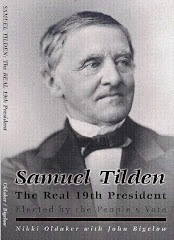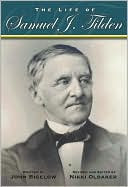
Today I will start from the beginning of Samuel Tilden's life long career so you can get a sense of the great political mind Tilden had. This letter is one if his first...In Letters and Literary Memos...There are two volumes of this book and the pages are filled with history as it happened and how it was dealt with. I wish these pages were required reading for each and every Congressional Representative today. The factual information and exchanged in these letters would offer our Representatives, Judicial, President and U.S. Citizens that care about our country the true history of America. The history recorded in these two volumes is precious and rich with the growth and pitfalls previously experienced. I think history can teach us and be our best guide to prevent us from repeating the same mistakes. I agree. Take note of the dates...Tilden's letter is dated in 1833 - yet the Great Fire of New York is dated 1835.
December 17, 1833...Tilden writes this letter to his father Elam about the great fire in New York City...
The most disastrous fire with which the city of New York has ever yet been visited is referred to in the following letter. It reduced to ashes pretty much every structure within the area bounded by Wall and Broad streets and the East River, a tract which then embraced nearly,
 if not quite all the important commission houses in the city; crippled all our insurance companies, and gave to the territory it covered a blow from which, after a lapse of nearly three- quarters of a century, it has but partially recovered. Like the great fire of London in the seventeenth century, it is still referred to as the Great Fire of 1835.
if not quite all the important commission houses in the city; crippled all our insurance companies, and gave to the territory it covered a blow from which, after a lapse of nearly three- quarters of a century, it has but partially recovered. Like the great fire of London in the seventeenth century, it is still referred to as the Great Fire of 1835.S. J. TILDEN TO ELAM TILDEN
" New York, December 17, 1833. Friday, 2.30 P.It.
"Mv Dear Father,—The last has been the most calamitous night New York ever saw. The very centre of the commercial part of the city — from Wall Street across William and nearly to Broad, and to Coenties Slip,—all is a mass of smouldering ruins. A concurrence of unfortunate circumstances rendered the fire thus disastrous. The engines had been much disordered, in consequence of the extensive fires on the previous night — the hose, many of them, frozen and unfit for use. The atmosphere was in a state peculiarly calculated to support and extend combustion, the wind blew with great violence, and the weather was so intensely cold as to clog and almost close up with ice the hose. The flames raged through the whole night with uncontrolled violence, impressing every beholder with the utter impotency of human effort to contend with the devouring element. The spectacle was grand and awful beyond conception. I shall not attempt to describe it. All the fires that ever occurred here before were perfectly insignificant in comparison.
" The question is now, not who is injured, but who has escaped? Almost all I know are involved in the common catastrophe. At No. 12, Mr. Hichcock burnt out; Mr. Birch, not even his books and papers saved. Mr. Brown burnt out, and his goods consumed in the street or in the stores to which they were removed. Mr. Starkweather not yet injured, but in imminent danger. Mr. Williams' employees, everything destroyed; and also Mr. Conckling's, I believe. At 14, Mr. Stewart's employees. At 20, Mr. Bronson among the lost; Mr. Soullard, same; Mr. Davis and escaped. Halsted and Baines, $40,000 lost;
20 to 30,000 saved. Hunt and Andrews, Conckling & , &c., &c.
" So vast is the destruction that insurance affords but a very insufficient security. The whole insurance capital of the city will scarce exceed one-half the amount of property consumed in one night! Estimates are very vague and uncertain—the loss, however, can hardly be less than twenty millions of dollars.
" There is not time to write a word more to-day.
" Affectionately yours,
" S. J. Tilden.



No comments:
Post a Comment
Post your comments: